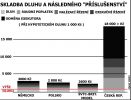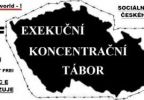
 „Freedom is never more than one generation away from extinction. We didn't pass it to our children in the bloodstream. It must be fought for, protected, and handed on for them to do the same, or one day we will spend our sunset years telling our children and our children's children what it was once like in the United States where men were free.“
„Freedom is never more than one generation away from extinction. We didn't pass it to our children in the bloodstream. It must be fought for, protected, and handed on for them to do the same, or one day we will spend our sunset years telling our children and our children's children what it was once like in the United States where men were free.“
Ronald Reagan
***
The information below can serve as a basis for Constitutional complaints and lawsuits against the Czech Republic. Will our descendants one day ask us, as we asked our fathers, "How could you let this happen?" J.Š.
***
The Czech Republic is violating international treaties and the Constitution with its execution and civil court codes, and the resulting execution mafia is also violating these laws
- to file a Constitutional complaint for the annulment of the part of Act No. 120/2000 Coll. of the Enforcement Code and Act No. 99/1963 Coll. of the Code of Civil Procedure that violates Articles 10 and 12 of the Charter of Fundamental Rights and Freedoms, i.e. part of the Constitution of the Czech Republic. It is not possible to arbitrarily disturb the homes and family life of citizens who do not owe money, to humiliate them and to plunder them in their own homes.
- The Constitutional Court should also establish legal certainty on the issue of 80% of futile foreclosures, which are artificially maintained, at the expense of the whole society, by the arbitrary interpretation of the foreclosure law by the foreclosure mafia. Article 11 of the International Covenant on Economic, Social and Cultural Rights imposes an obligation on States Parties to provide their citizens with adequate and improving ( as far as possible) living conditions, not to keep them until their untimely deaths in failing health as outlaws and slaves to unpaid foreclosure tariffs ( see table) with the prospect of no longer being able to live a normal life
- to file petitions and lawsuits with international organizations and courts, esp. For violation of these international obligations by the Czech Republic (Article 10, Article 12 of the Charter of Fundamental Rights and Freedoms, Article 11 of the International Covenant on Economic Rights)
***
Czech Gestapo - Mobility Execution EU-Registration number 27.11.2018
***
The Charter of Fundamental Rights and Freedoms guarantees:
Article 10
Everyone has the right to have his human dignity, personal honour, reputation and name preserved.
Everyone has the right to protection from unwarranted interference with his private and family life
Article 12
The home shall be inviolable. It may not be entered without the consent of the occupant.
A search of the home shall be permissible only for the purposes of criminal proceedings, on the written, reasoned order of a judge. The manner of carrying out a search shall be determined by law.
Other interference with the inviolability of a dwelling may be permitted by law only if it is necessary in a democratic society for the protection of life or health of persons, for the protection of the rights and freedoms of others or to avert a serious threat to public safety and order. If the dwelling is also used for business or other economic activities, such interference may be permitted by law even if it is necessary for the performance of public administration tasks.
International Covenant on Economic, Social and Cultural Rights
Article 11
The States Parties to the Covenant recognize the right of everyone to an adequate standard of living for himself and his family, including adequate food, clothing and housing, and to the continuous improvement of living conditions. States Parties shall take appropriate steps to ensure the realization of this right.
RATIONALE
Breach of domestic liberty is a criminal offence under the Criminal Code, but bailiffs are permitted under Act No 99/1963Sb ( in particular sections 325A, 325B ) to forcibly enter the homes of third parties who, although not owing money, are 'believed by the bailiffs to be harbouring a debtor in their home'. In principle, this is the same procedure as for a person whom the secret police and Gestapo of the Nazi regime believed to be harboring a citizen of Jewish origin. Whoever hid a Jew had to lose everything! Everything is based on the principle of the presumption of guilt, except for the violation of Articles 10 and 12 of the LZPS. While the police, when investigating a murder case, must have a court warrant to search the particular apartment or house of a person who is reasonably suspected of criminal activity, the bailiff does not. Consequently, they are entitled under Czech law to come to the apartment to list the property for auction, even though no one is home and the owner of the apartment is unaware of the uninvited guests. The law no longer even requires police assistance for bailiffs to enter third parties' flats or houses. The executors only need a locksmith to pick the lock. They don't concern themselves with who owns what. They take everything. The robbed person has to prove that the property belongs to him and not to the debtor.
Bailiffs are increasingly focusing on so-called mobile foreclosures, which mainly affect those close to the debtor. They often do not even know about this risk or have very distorted information not only about what obligations and rights the bailiff has, but also what rights the debtor and his relatives have. Above all, they do not know how to protect their assets effectively and often believe various myths. Mobile foreclosures in the homes of the debtor's relatives, often parents, children, boyfriends or girlfriends, are humiliating and very often involve controlled psychological pressure bordering on oppression or blackmail. These methods of debt collection, although very effective, seriously damage not only the rights of non-debtor citizens. According to the Czech interpretation of the law, the bailiff has to prove, on the basis of the so-called rebuttable legal presumption, that everything at the address where the debtor (even if only occasionally) resides is his property. The bailiff therefore does not have to prove anything. On the contrary, the person affected by the wrongful execution must prove ownership and not merely claim ownership of the property. According to Czech law, the bailiff may enter or arrange for a locksmith to enter any premises where the debtor is staying, even without the owner's consent and without the police, which is what happens in the vast majority of cases. This is often done on the basis of clues, or rather pretexts, to the debtor's whereabouts. However, the police themselves cannot enter your home without the bailiff, or without your consent, or without a court order, even in the context of criminal proceedings.
Bailiffs often disguise themselves first as gas company employees or postal carriers. They only legitimise themselves after they have opened the flat or house and literally pushed their way in. In this way, the bailiffs simplify their entry and, apart from the element of surprise, gain immediate control of all the assets in the entire property, regardless of how many other people in arrears are occupying the property.
Even if the furnishings of the house or apartment are owned by the property owner under the lease, the owner of the items only has the right to request that they be removed from the inventory. However, it is the bailiff who seized the items who decides on this right of the owner, and he does so by order. It is only after its rejection that the owner of the goods may apply to the competent court. If he is unsuccessful in court, he will pay the costs of his legal representation, the court and the costs of the opposing party, in addition to the loss of his belongings. Mobile execution is only a last resort; wage deductions and less invasive means must be resorted to first. This is indeed the case in the law after the amendment of the Execution Code and it sounds logical and humane, which was probably the purpose. However, if a mobile execution occurs a week after, it does not contradict the law. Moreover, a close relative of the debtor has no chance to know about the executions or those less invasive means, because he is not a party to the proceedings. So the first thing most of the debtor's loved ones encounter is just a mobile foreclosure, where they have no good choice but to pay according to the often unreasonable demands of the bailiff, or risk losing the complete furnishings of their home.
I don't owe money and I have documents for most things, a deed of gift, a bill of sale from my brother, etc. so the bailiff is out of luck? The bailiff at the place of mobile execution may, but is not obliged to, examine or evaluate the documents for the movable things, and you do not have to be at home at the time of his visit. The bailiff may take into account the evidence presented that the items do not belong to the debtor, but if he fails to do so, he is not committing anything illegal according to the Czech legislator! Unfortunately, often lawyers, even in good faith, advise their clients on legal procedures saying, that should be enough, but without any guarantee. They then pay for the act that will be on the invoice. However, if this act does not stand up to the bailiff, they will often pay tens of thousands for each subsequent act until final judgment. If they fail, not only will they lose their belongings or the roof over their heads, but they will pay their lawyer, court fees and, of course, the costs of the other party.
Act No. 120/2001 Coll., the Act on Bailiffs and Enforcement Activity (the Enforcement Code) introduced the commercialisation of the administration of law and justice in the Czech Republic. The alleged inability of the state to ensure the enforcement of its own decisions was the basic excuse for adopting the idea of extrajudicial executions carried out by private entities "entrusted" by the state. The result?
According to the words of the bailiffs themselves, over 80% of claims are already uncollectable. Yet not a single enforcement agency has taken advantage of the law to stop the senseless exactions. Why? I think you know the answer: because he will not lose this money, he will immorally (in the words of the Constitutional Court) steal it from other debtors who can still pay and, above all, from creditors who, thanks to the tariffs of the enforcement mafia, already have 80% of the so-called uncollectable debts. Let's take an example, now I will say that at the beginning there were 400 thousand people who could pay and 400 thousand who could not, the first 400 thousand therefore bore the costs associated with the futile recovery of the second half in this mode until they themselves could not pay and joined the second half. And over time, it became a majority, with the 150,000 foreclosures bearing the costs of the futile enforcement of foreclosures after the remaining 650,000 for a total of 4,500,000 foreclosures. The foreclosure entrepreneurs don't mind, because it costs them nothing, they just charge it to others, and this way they have the hope that, if they maintain for years and decades hundreds of thousands of futile foreclosures, someone can inherit some of those hundreds of thousands, get married, move in with relatives, who then get raided by the foreclosure gestapo for helping their neighbor ( if they think the debtor is there ), or maybe win at sports. It doesn't matter that it will be a vast minority, because there will be some profit and all the time it will be shouldered by others... So profit without contributing to the misery of others, commercialization of law enforcement and justice - welcome to the Czech Republic, which violates the Charter of Fundamental Rights and Freedoms, the International Covenant on Economic, Social and Cultural Rights, its own Constitution and laws. A country where private enforcement has more powers than all the security forces combined, including the police.
Section 268(1)(E) of the Code of Civil Procedure regulates the situation where, after the performance of acts aimed at identifying the property of the debtor, no property of the debtor is identified or its value is insufficient to cover the costs of the execution, so that its implementation would only lead to an increase in costs that could not be covered by the proceeds. In such a case, the executor shall submit a motion to the court to suspend the execution, stating what actions he has carried out to identify the property and with what result. The request for the enforcement agent to continue the execution must contain compelling reasons why the court considers that it is still possible to locate the assets of the debtor. It is not the debtor but the bailiff who initiates the stay of execution pursuant to Article 268(1)(e) of the Code of Civil Procedure, but the provisions of Article 290(1) of the Code of Civil Procedure apply, regulating a special reason for the suspension of the execution, can be applied already because on the date of filing the application the necessary time has elapsed since the commencement of the execution proceedings (at least one year) and I further import that if the execution by sale of movable property fails to list any movable property that could be sold, this will be a reason for the procedure leading to the suspension of the execution and not, of course, according to § 268 para. 1(e) of the Code of Civil Procedure in conjunction with Section 52(1) of the Enforcement Code, but even under a special provision, namely Section 326A of the Code of Civil Procedure. See the decision of the Supreme Court, Case No. 20Cdo1062/2015 of 31.10.2006. The bailiff cannot carry out the execution for an arbitrary period of time. In order to reach a legal conclusion within the meaning of Article 268(1)(e) of the Civil Procedure Code, it is "necessary for the bailiff and the beneficiary to quantify their costs", here the relevant legal provisions, in particular Decree No. 330/2001 Coll, 484/2000 Coll. and 178/1996 Coll. The fact that the debtor has no enforceable assets cannot be attributed to him; moreover, this procedure is contrary to "the doctrine that the law permits only such enforcement as serves to satisfy the creditor and should not be used where it appears that it cannot lead to that end." Any other course of action is chicanery and a manifestly purposeless exercise of execution, which is contrary to law.
According to Section 268(1)(e) of the Code of Civil Procedure, it is not the debtor who initiates the proceedings but the bailiff. However, the latter not only does not, as a rule, file such an application, but also disagrees with the possible suspension of the execution and emphasises that the suspension of the execution for lack of assets should only take place after the bailiff himself has filed such an application. This, in the broader context of the other provisions, is an erroneous and arbitrary interpretation of the law, which provides bailiffs with cover for the malicious persecution of citizens. If the bailiff's offices do not use the provisions of Section 268(1)(E) of the Code of Civil Procedure and maintain legally inconsistent executions, it is because as private businessmen, even with powers delegated by the state, they are not concerned with upholding the law, but a priori with maximizing profits and keeping the largest number of the population in their power. Of course, the debtor may also file a "Motion to Stop Execution" under other provisions and, in accordance with Article 269(1) of the Civil Procedure Code, the court must decide to stop the execution both on motion (of any of the parties involved) and on its own motion. Excuses are not appropriate!
Daniel Novák
1.12.2021
Translated with www.DeepL.com/Translator (free version)







Read more...